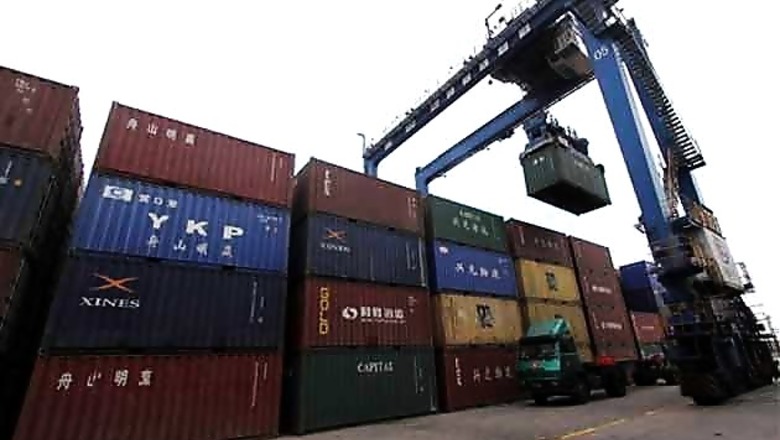
views
New Delhi: India's economy likely remained in its deepest slump for nine years in the quarter ending in June, but high inflation and polarized politics leave the country's leaders with limited scope to crank up growth.
Weak demand in the United States and Europe has hit exports of IT services and manufactured goods, but the heaviest toll on the economy is from overspending and the lack of reforms at home - a point made by ratings agencies Fitch and Standard & Poor's, who have threatened to downgrade India's sovereign debt to junk.
Distracted by a scandal over the allocation of coalfields that has paralysed parliament, the government has further delayed planned big-ticket economic reforms. For now, it is focused on smaller measures it hopes will put the economy on track, including possible budget cuts later in the year.
Many G20 central banks have been moving to support growth through monetary stimulus.
But the Reserve Bank of India is lothe to reduce borrowing costs, among the highest of major economies, until the government reins in spending on subsidies and increases capacity to fight stubbornly high inflation.
"India in a way is in an abnormal cycle with the combination of below-trend growth and above-trend inflation. And monetary policy cannot be the panacea," said Rajeev Malik, a senior economist at brokerage CLSA in Singapore.
A Reuters poll of 38 economists produced a median forecast of 5.3 per cent year-on-year GDP growth for the April-June quarter, unchanged from January-March, which was the slowest growth rate since the same quarter in 2003.
Forecasts ranged from 4.8 per cent to 6 per cent in the poll, ahead of the data due for release at 0530 GMT on Friday.
"We'll be in that 5 to 6 per cent range for next year also," said CLSA's Malik. "The question is going to be how effective is any kind of response from the government and that is anybody's guess at this point."
While strong by global standards, such rates are considered almost recessionary in India, which targets 9 per cent to provide jobs for a bulging young population.
Worried about social unrest if aspirations are not met, Prime Minister Manmohan Singh this month called high growth a matter of national security.
Singh's economic advisory panel this month cut its forecast to 6.7 per cent for economic growth in the year to next March (2012/13), down from a previous forecast of 7.5-8 per cent. The RBI predicts growth of 6.5 per cent in the same period.
Newly reappointed Finance Minister P Chidambaram has vowed to revive an economy he steered through the 2008 credit crunch with tax cuts. The buzz on his return to the ministry helped a market rally, further fuelled by a flurry of minor policy moves.
India never fully unwound the consumer-oriented tax breaks that some economists say caused the economy to overheat. With inflation at close to 7 per cent for 2-1/2 years and a yawning fiscal deficit in the cross-hairs of ratings agencies, India, like China, has little space for a new round of stimulus.
Chaotic scenes in parliament this week highlighted political gridlock scuppering plans to cut runaway fuel subsidies and invite foreign supermarkets to open shop. Industrial output contracted in June, and the country is running a wide current account deficit that has driven the rupee to record lows.
Singh, the pilot of India's initial reforms as finance minister in the 1990s, has seen his second term as prime minister dogged by graft scandals that have sapped his government's capacity to further remodel the economy.
He has a window to implement unpopular economic policies after the parliament session finishes next week and before elections in the state of Gujarat towards the end of the year, but a drought driving up farm aid casts doubt on that timetable.
"The current political environment puts a question mark on all the markets' reform expectations being met," J.P. Morgan said in a research report. Optimism that reforms are imminent drove a 12 per cent rally in Indian equities in the last three months, but the "bulls are now getting edgy," the report said.
The Reserve Bank of India next reviews policy on September 17, and recent hawkish comments suggest it is in no mood to lower rates.
A drought in several farming states has delayed a plan to raise the price of heavily subsidised fuels such as diesel, a major contributor to a fiscal deficit that hit 5.8 per cent of GDP in the last fiscal year.
In private, officials admit a deficit target of 5.1 per cent this year will be missed if fuel prices do not rise. One senior official involved with government finances said the ministry was considering an across-the-board cut to budgeted planned spending, with a task force due to report on the issue.
"If the oil subsidies are not controlled, the fiscal deficit could shoot up to 5.4 or 5.5 per cent of GDP," he said. "There is a proposal to have 10 per cent cut in the planned expenditure if needed."
An architect with Singh of the 1990s market liberalization, Chidambaram is doing his best to boost growth and balance the books through small-bore measures. Last week the ministry made it easier for companies to borrow overseas, where interest rates are almost zero compared with above 8 per cent in India.
Chidambaram approved an $180 million FDI proposal from Walt Disney Corp (DIS.N), part of a backlog of proposals by foreign companies now being fast-tracked. He asked state-run banks to lend more money to consumers for durables like cars and washing machines, and credit to help stimulate farm growth.
Chidamabaram's immediate goal is to avert a downgrade that would make India the first country to trade at junk in the BRICS group - Brazil, Russia, China, and South Africa.
Credit default swaps suggest India is already a bigger investment risk than emerging markets such as Vietnam and more than double the risk of fellow BRICS.
The capital market division of the economic affairs ministry regularly updates the agencies about steps taken to improve the fiscal situation.
"We assume they would wait before taking any action," said another senior finance ministry official. "If they downgrade us in a hurry and the economy starts picking up in the second half won't they lose face?"


















Comments
0 comment